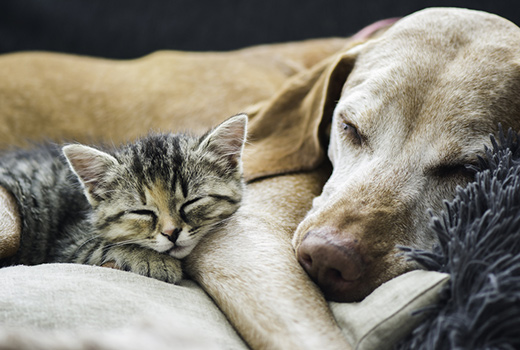Ingrid Newkirk, the founder of PETA (People for the Ethical Treatment of Animals), said, “When it comes to pain, love, joy, loneliness, and fear, a rat is a pig is a dog is a boy. Each one values his or her life and fights the knife.”
How should a believer respond to this statement? First, our understanding of the role of animals must be grounded in the account of creation in Genesis and the Word of God generally. The creation account in Genesis 1 and 2 makes a distinction between humans and animals. There are several differences worthy of note.
Humans are dichotomous — that is, they are made up of two parts: soul and body. Animals are singular in composition. The Bible is clear that animals do not have a soul. The Bible betrays no concern for the eternal destiny of animals.
Additionally, Genesis 1:26 states, “Then God said, ‘Let Us make man in Our image, according to Our likeness.’” The creation of humanity is wholly and completely distinct from the creation of animals because humans are created in the image of God. The imago dei is the distinct privilege of humanity.
Also, God gave humanity dominion over all of creation, including animals. Genesis 1:26 goes on to say: “‘And let them rule over the fish of the sea and over the birds of the sky and over the cattle and over all the earth, and over every creeping thing that creeps on the earth.’” God assigned dominion to humanity, not to animals.
Beyond that, humanity makes moral choices; animals do not. Animals certainly have some level of intelligence. Our dog can learn not to come into the living room. However, animals do not have a moral standard they live by.
Finally, in the establishment of marriage and the family, God gave Adam a helper. Adam and Eve were to leave the home of their parents and cling to one another as husband and wife. This is a union of a man and a woman that is to be a lifelong covenant. The Lord did not provide a lifelong helper for the animals He created. Humans and animals share a number of physiological similarities. However, humans are the special creation of God with rights far beyond those of animals.
Therefore, animals do not have the rights of humanity and should not be elevated to the status humans occupy. But that is not to say that animals are not valuable to the Lord. Though animals are lower than humans, they are certainly the creation of God. For believers, we should not think in terms of animal rights, but in terms of animal care. God cares for His creation, and so should we. God’s gift of animals to humanity is not license for mistreatment or cruelty. Proverbs 12:10 says: “A righteous man has regard for the life of his animal, but even the compassion of the wicked is cruel.” From this verse, we discern that the righteous will treat animals well. As stewards of God’s creation, believers should be keenly interested in the well-being of animals.
Next, we should recognize that animals are part of God’s “common grace.” Common grace is that grace of God that does not include salvation, which all humanity benefits from. For example, rain that waters the earth is part of common grace. Both believers and nonbelievers enjoy the benefits of rain. In the same way, animals are part of God’s common grace. Animals can bring joy and fulfillment to the lives of humans. Both believers and nonbelievers participate in this common grace.
Beyond enjoyment as companions, animals have additional benefits to humanity. Animals are given to humanity for food. In Genesis 9, God said to Noah: “And God blessed Noah and his sons and said to them, ‘Be fruitful and multiply, and fill the earth. The fear of you and the terror of you will be on every beast of the earth and on every bird of the sky; with everything that creeps on the ground, and all the fish of the sea, into your hand they are given. Every moving thing that is alive shall be food for you; I give all to you, as I gave the green plant.’” In Acts 10, the apostle Peter had a vision of a sheet being let down from heaven, and in the sheet there were all kinds of animals, both clean and unclean. Peter heard a voice saying, “Take and eat.” The Lord lifted the dietary restrictions embedded in Judaism.
Jesus most certainly was not a vegetarian. In the Gospels, Jesus is described as going up to Jerusalem for the Passover. There is no reason to believe that Jesus did not partake of the Passover lamb, as all Jews would have done. Also, in Luke 24, after His resurrection, Jesus appeared to the disciples while they were in the upper room. Luke records: “And when He had said this, He showed them His hands and His feet. While they still could not believe it because of their joy and amazement, He said to them, ‘Have you anything here to eat?’ They gave Him a piece of a broiled fish; and He took it and ate it before them.”
As believers, let us enjoy the benefits of God’s creation while also caring for the creation in a way that pleases Him.
— Frankie J. Melton Jr. is assistant professor of Christian studies at North Greenville University and pastor of Heath Springs Baptist Church.

